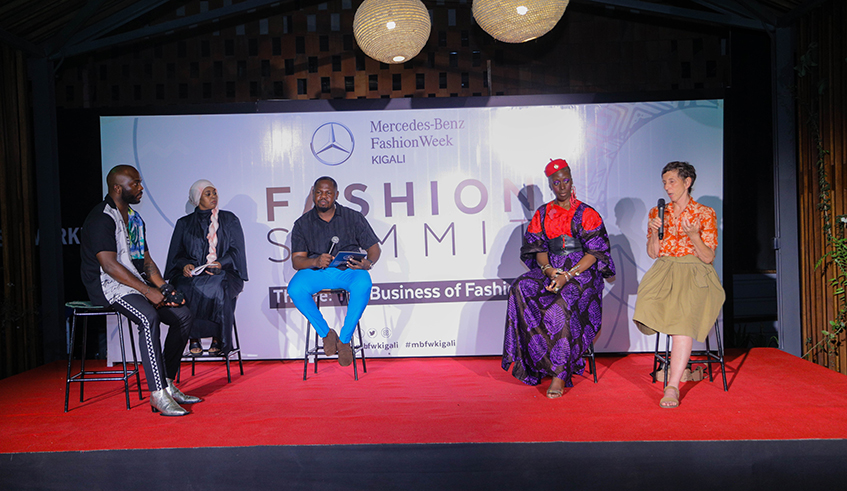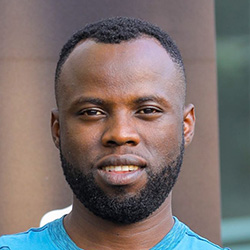

Belgian fashion designer Chris Vitj can’t believe there is not a single school in Rwanda teaching fashion design despite incredible efforts Rwanda designers put in to produce fine collections that compete at the international market.
Vitj was speaking during the Fashion Summit held at Norrsken, Kigali, that brought together Africa’s finest designers and beyond to discuss the growth of Africa's fashion industry from a business perspective.
Themed ‘The Business of Fashion’, the fashion summit was part of a series of activities that are on the agenda of the second edition of Mercedes-Benz Fashion Week going on in Kigali since Monday, May 6.


The fashion summit is themed on the business of fashion during the Mercedes Benz Fashion Week Kigali at Norrksen Kigali on May 17, 2022. Dan Nsengiyumva
Over 100 international guests who are normally big players in the fashion industry, including 27 designers, are in town ahead of the six-day fashion event which runs until May 21, as players in the fashion industry from all walks of life convene to share their best experiences about the growth of the fashion industry.
Local designers who attended the summit said that manpower remains the biggest challenge they face during their everyday life, with the problem forcing the whole fashion industry in Rwanda lagging behind and going off the pace.
"The number one challenge that we face is manpower. Tailors are not that reliable if you are not the one making the production yourself, you really struggle,” said Rwanda’s fast-rising designer Cynthia.
"You can go ahead and design but in the end it’s really hard to make it sustainable with the manpower that we have,” she added.
The issue, however, is becoming a common challenge for the fashion industry not just in Rwanda but Africa at large.
And, while Vitj was suggesting only education is the key to finding the solutions to persisting challenges existing in the African fashion industry, including lack of manpower, she was surprised to know that Rwanda has got no school for fashion design yet despite enjoying a fast-rising industry in the past few years.
"What I know here in Rwanda is that there is no school for fashion design. For me it was unbelievable to know this because everyone in Europe is saying ‘Kigali, Kigali! fashion, fashion…Yeah, yeah, there is a lot of fashion but there is no fashion school. I hope someday, starting with a few people here, there will be a kind of school like that. That is my hope,” said the designer, who was a fashion lecturer for a decade until 2021.
Solution?
There are instances of African designers who struggle with production due to shortage of manpower and that remains a huge challenge for the growth of the African fashion industry.
Vitj believes that inadequate manpower not only exists in Rwanda as she also noticed it in other countries she has been to like Zimbabwe, South Africa, Burkina Faso, Mali among other countries and hence affects quality production.
She sees no better and durable solution to this than education.
Chris Vitj a fashion designer from Belgium addressed the participant during the fashion summit themed on the business of fashion during the Mercedes Benz fashion week Kigali on May 17. Dan Nsengiyumva
"It’s always almost the same problem and there is need for a kind of solution for designers, something I hope that will one day change. I think education is a very important topic towards finding the solution to this problem,” she said.
As participants discussed possible solutions to the challenges that African designers face, Nigerian Prince Adegoke Awalade, the Creative Director of Saint Calypso, said that time is now for African designers to embrace collaborations if they are to achieve a competent and successful fashion market on the continent and globally.
"I am aware Africa’s fashion is being westernized. But I am telling you, all the clothes I am wearing now are made in Nigeria. Collaboration is another key to the development of African fashion. Let’s collaborate and push these [our products] out of Africa. Let’s do this and we can do it!” Awalade said.
This year’s Mercedes-Benz Fashion Week happening in Kigali has attracted designers who will be presenting their finest fashion collections making headlines in their respective countries namely the United States, Canada, Ghana, Uganda, South Africa, Kenya, United Kingdom, Malawi, Tanzania, Nigeria, France and host nation Rwanda.
The event runs until Saturday, May 21.


